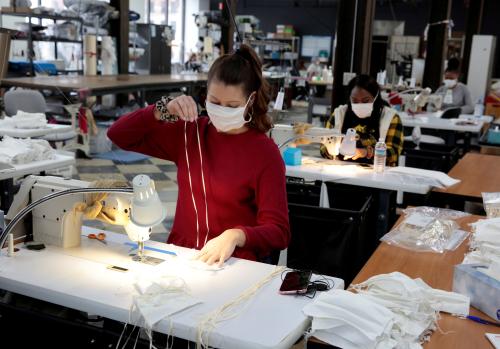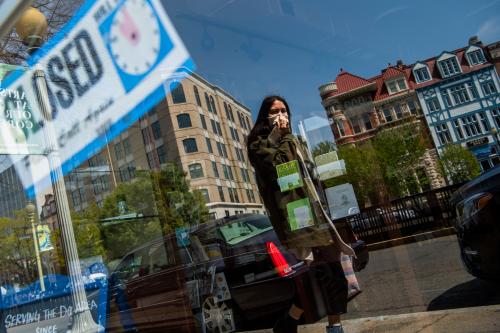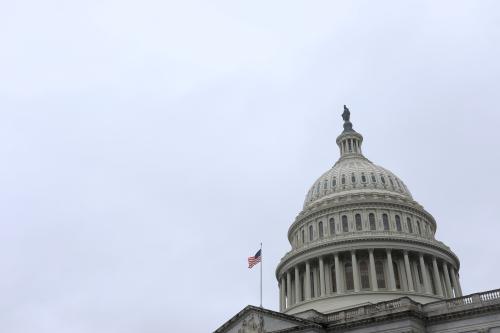This op-ed was originally published in Barron’s on May 8, 2020.
For months, public officials across the political spectrum urged the Trump administration to fight the coronavirus pandemic using the Defense Production Act. This authority would get manufacturers to produce, both more and more quickly, masks, ventilators, test kits, and other medical equipment. With few exceptions, the administration refused to do so, claiming that private companies and private markets were meeting our needs or, in the case of COVID-19 tests, that they’re the states’ problem. Federal government use of the DPA, the president concluded, would be akin to socialism.
Yet last week, the president decided that socialism to help cattle ranchers, hog farmers, and chicken producers is OK. He signed an executive order authorizing the use of DPA to reopen meat plants that had been closed because they were infested with the coronavirus. Unlike COVID-19 tests, the president declared that meat and poultry producers are “critical infrastructure.” He directed the secretary of agriculture to “take all appropriate action…to ensure that meat and poultry processors continue operations consistent with the guidance for their operations jointly issued by the CDC and OSHA.”
The executive order suggested both that the president can order plants to reopen and that plant employees would be protected by that order. Neither is true.
The Defense Production Act does not authorize the forced reopening of plants. Title I of the Act does allow the federal government to “prioritize” and “allocate” private production if a plant is already producing and if production is economically viable. When agencies attempted to issue orders to businesses that were uneconomic, the businesses nonetheless shut down.
Moreover, the DPA Title II authority to take over (“requisition”) plants was terminated in 1953, and formally repealed in 2009. Under Title III of the current act, the government can only offer incentives to produce, such as purchase guarantees or loans. Of course, companies can voluntarily choose to reopen their plants, but the president cannot order them to do so. Socialism hasn’t been part of the DPA for 67 years.
Neither does the executive order protect either workers or employers. Operating in a manner “consistent with” the Centers for Disease Control and Prevention and OSHA interim guidance doesn’t require any specific worker protection against the COVID-19 threat that closed these facilities in the first place, nor will it shield these businesses from liability in private lawsuits brought by infected employees.
Although the Occupational Safety and Health Act requires employers “to furnish to each [worker]…employment and a place of employment, which are free from recognized hazards that are causing or are likely to cause death or serious physical harm,” OSHA has issued no rules on which workers or their employers can rely to know what is “safe” during the coronavirus outbreak.
In their interim guidance, CDC and OSHA recommend safeguards, but OSHA says explicitly: “This guidance is not a standard or regulation, and it creates no new legal obligations.” The agencies note that their recommended measures are hard to apply in meat and poultry processing facilities where, for example, workers are side-by-side on the line and spacing them out would require time and money. They recommend safeguards “if feasible.” They would allow infected, but asymptomatic workers to stay on the line. They do recommend sending sick workers home, but don’t require it and don’t require sick leave to make it “feasible.”
Although the Department of Labor announced it wouldn’t enforce any remaining laws if meat processors “in good faith” documented why compliance was “not feasible,” neither the department nor the Defense Production Act offers any immunity from private suits by employees with respect to virus-related safety risks. Being “consistent with CDC and OSHA guidance,” therefore, by itself protects neither workers from COVID-19 nor employers from lawsuits.
Although the executive order does nothing to affect workplace safety standards, resolving them is literally a matter of life and death. OSHA could step up and do its job to set binding safety standards for meat processing and other industries. At a minimum, it could issue emergency regulations requiring masks and testing until a given location has satisfied the Phase I criteria of the CDC guidelines. If it does not, these matters will be left to Congress, the courts, or both.
The DPA is not a magic wand that can force plants to reopen. That the administration invokes it should be recognized as exhortation, not law. It provides no legal protections. Meat and poultry processors considering reopening should make their own decisions and recognize the risks they take on by doing so.
As former senior Defense Department officials charged with administering DPA authorities, we know how useful the Act can be to accelerate production and prevent hoarding and price gouging. It should be used, as intended, to provide critical medical and other supplies to fight the COVID-19 virus, not as cover to reopen unsafe factories and spread the virus further.
The authors did not receive financial support from any firm or person for this article or from any firm or person with a financial or political interest in this article. They are currently not an officer, director, or board member of any organization with an interest in this article.








Commentary
Op-edThe president can’t force meat factories to open
May 11, 2020